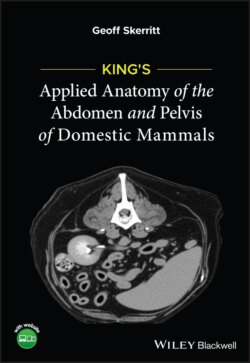Читать книгу King's Applied Anatomy of the Abdomen and Pelvis of Domestic Mammals - Geoff Skerritt - Страница 42
2.4 Clinical Conditions Affecting Gastrointestinal Function
ОглавлениеThe clinical presentation of gastrointestinal disease involves one or more of the following clinical signs (see Sections 4.3, 5.3, and 6.3):
1 Acute diarrhoea
2 Chronic diarrhoea
3 Vomiting
4 Weight loss
5 Abdominal discomfort
6 Anorexia
7 Presence of fresh or altered blood in the faeces.
Acute diarrhoea may be mild with no other clinical signs and due to a dietary trigger. Severe diarrhoea may result in dehydration, abdominal pain and a body temperature increase, and it may be due to an infection. Chronic diarrhoea, lasting more than 2 weeks, can have a variety of aetiologies ranging from neoplasia to hyperthyroidism (feline). Clinical signs such as increased or decreased frequency of defaecation or the presence of blood in the faeces are all diagnostically significant and may help in the localisation of intestinal disease.
A vomiting centre, located in the medulla oblongata of the hindbrain, mediates the vomiting reflex. The differential diagnosis of vomiting can be quite involved, although more so in dogs and cats rather than in the larger animals. Vomiting can be acute or chronic and may originate in the stomach or the small intestine; the possible causes are many and serious or trivial. Retching is followed by abdominal contractions resulting in forceful expulsion of oesophageal and gastric contents.
There are many possible causes of weight loss in animals. In dogs and cats disorders of malabsorption (see Section 5.3.5) may result from inflammatory bowel disease or severe parasitism. In farm animals there are a number of specific diseases that may cause weight loss, e.g. Johne’s disease in cattle and sheep (see Sections 5.3.2 and 5.3.3).
Abdominal discomfort in animals is usually detected by the patient’s restlessness and pain on palpation. In dogs gastroenteritis and gastric dilatation and volvulus (GDV) are severe causes of abdominal pain requiring urgent attention (see Section 4.3.5). In horses colic is a serious cause of abdominal pain (see Section 6.3).
Loss of appetite (anorexia) may have many causes in dogs ranging from dietary preference to a variety of causes warranting clinical assessment. In horses the explanation for a loss of appetite may be dental pain.
Haemorrhagic gastroenteritis is potentially a serious cause of blood in the faeces of dogs. Other possible causes are parasitism, parvovirus infection, E. coli infection and neoplasia.
